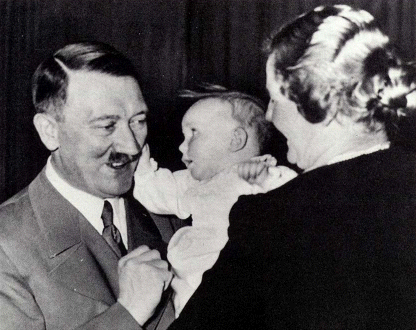In 2007 Desmond Warzel wrote “Wikihistory,” an intriguing, very brief science fiction short story in the form of a series of messages posted to a time-travelers’ forum. As one writer noted at the time it was published, Wikihistory is “basically a Wikipedia edit war, where the old hands have to keep on slapping down the noobs [new, inexperience people] for killing Hitler”
Here’s how the story opens:
International Association of Time Travelers: Members’ Forum
Subforum: Europe – Twentieth Century – Second World War
Page 263
11/15/2104
At 14:52:28, FreedomFighter69 wrote:
Reporting my first temporal excursion since joining IATT: have just returned from 1936 Berlin, having taken the place of one of Leni Riefenstahl’s cameramen and assassinated Adolf Hitler during the opening of the Olympic Games. Let a free world rejoice!
At 14:57:44, SilverFox316 wrote:
Back from 1936 Berlin; incapacitated FreedomFighter69 before he could pull his little stunt. Freedomfighter69, as you are a new member, please read IATT Bulletin 1147 regarding the killing of Hitler before your next excursion. Failure to do so may result in your expulsion per Bylaw 223.
At 18:06:59, BigChill wrote:
Take it easy on the kid, SilverFox316; everybody kills Hitler on their first trip. I did. It always gets fixed within a few minutes, what’s the harm?
At 18:33:10, SilverFox316 wrote:
Easy for you to say, BigChill, since to my recollection you’ve never volunteered to go back and fix it. You think I’ve got nothing better to do?

If time-travel to the past were possible it likely would be true that “everybody kills Hitler on their first trip.” Many of us who endorse just warfare would like to think that, if we possessed the courage, we’d have joined Dietrich Bonhoeffer and the others involved in Operation Valkyrie in their plot to assassinate ein Führer. Going back in time and stopping the brutal dictator before he slaughtered millions therefore has a strong and obvious appeal.
But would we go back and kill baby Hitler?
That was the question recently asked in a poll by The New York Times Magazine. Of those who responded, 42 percent said they would, 30 percent said they would not, and 28 percent said they weren’t sure.
The question was even asked of some Republican presidential candidates. Gov. Jeb Bush said that he would kill Hitler as a baby, while Dr. Ben Carson said that he would not. (Carson was asked a slightly different question: would he abort baby Hitler. He responded by clarifying that he would not abort anyone.)
If you find the question to be silly, it’s because it is rather silly. The entire scenario is predicated on a pile of absurdities, such as the metaphysical implications of time travel (e.g., killing Hitler might prevent us from being born). But even silly questions can have a purpose, and this question can help us as Christians better clarify both our moral intuitions and our trust in providence.
You Don’t Have the Authority to Kill Adi
From a Christian perspective the answer seems rather obvious: If we had the time traveling abilities, we should not use them to kill dictators in their infancy.
There are many sophisticated ethical rationales for why that particular action would be morally unjustifiable. Rather than exploring all the nuances and listing all the reasons, though, let’s consider one simple, humility-based ethical model.
Let’s assume we were transported back to a small Austrian village of Braunau Am Inn at 7:30 pm on April 20, 1889. Baby Adolph—who went by the nickname Adi—was born an hour earlier and is sleeping in his crib. What would it take, from a practical and moral perspective, to justify killing little Adi?
At a minimum it would require three things: (1) Ability, (2) Authority, and (3) Will. Since you time-traveled specifically for this purpose, you presumably have the will to commit to the act. You also, being an adult, have the ability to overpower a newborn. That leaves only the matter of authority. And that’s where Christian morality says we must stop. Simply put, you have no authority to kill Adi.
Without legitimate authority for the killing you would merely be murdering an innocent child. And there is no generalized legal or moral rationale for such an act. Even the most liberal reading of preemptive action under just war doctrine cannot justify killing an infant now because of what they will do in the future as an adult. Indeed, there is only one way the action would be legitimate: If God directly told you to take the child’s life.
But we, as time-travelling would-be assassins, have a compelling reason for assuming that God did not give us such a mandate: We are aware of Hitler’s crimes.
Trust God With the Past
There is one person who has the ability and authority to make killing the child justifiable—God himself. As an omnipotent being who has the power over life and death (Deuteronomy 32:39), God meets the prerequisites for a justified killing. Since it is a matter of God’s will whether the child is to live or die, we can assume that it was his will that the child live. Why? Because we in the twenty-first century know about the adult Hitler, we have sufficient reason to believe it was God’s will that the child not die in infancy. If it were not God’s will, the baby Adolph would never have survived to adulthood.
By saying, “Yes, for the good of mankind, I’d kill baby Adolph” we are essentially saying God willed wrongly and that we would use or ability and will to get it right. It is saying that we are willing to put our trust in our own authority and our knowledge of what is good and evil. It is saying that rather than trusting in the sufficiency of the revealed will of God (“You shall not murder.” – Deuteronomy 5:17) we can take upon ourselves the authority to “correct” his hidden will (i.e., his will to allow baby Hitler to live).
Obviously, none of us are members of the International Association of Time Travelers, and there is no chance we will face this particular test. But considering this hypothetical scenario, and our initial response to the question, can help us to reflect on the ways that we do second-guess God’s hidden will about things that happened in the past.
As finite creatures it’s natural for us to ask “Why?”—why did God allow our child to die, why did God allow the storm to destroy our home, why did God allow a monster like Hitler to kill millions? That is natural, and not itself a sin. The sin comes not in the asking why but in harboring in our heart the desire, even if we don’t possess the ability, to “fix what God got wrong.”
Instead of wishing we could travel back in time to correct “God’s mistakes” we should look forward to the future in eschatological hope, praying this prayer attributed to Reinhold Niebuhr:
God, give me grace to accept with serenity
the things that cannot be changed,
Courage to change the things
which should be changed,
and the Wisdom to distinguish
the one from the other.
Living one day at a time,
Enjoying one moment at a time,
Accepting hardship as a pathway to peace,
Taking, as Jesus did,
This sinful world as it is,
Not as I would have it,
Trusting that You will make all things right,
If I surrender to Your will,
So that I may be reasonably happy in this life,
And supremely happy with You forever in the next.
Amen.
Download your free Christmas playlist by TGC editor Brett McCracken!
 It’s that time of year, when the world falls in love—with Christmas music! If you’re ready to immerse yourself in the sounds of the season, we’ve got a brand-new playlist for you. The Gospel Coalition’s free 2025 Christmas playlist is full of joyful, festive, and nostalgic songs to help you celebrate the sweetness of this sacred season.
It’s that time of year, when the world falls in love—with Christmas music! If you’re ready to immerse yourself in the sounds of the season, we’ve got a brand-new playlist for you. The Gospel Coalition’s free 2025 Christmas playlist is full of joyful, festive, and nostalgic songs to help you celebrate the sweetness of this sacred season.
The 75 songs on this playlist are all recordings from at least 20 years ago—most of them from further back in the 1950s and 1960s. Each song has been thoughtfully selected by TGC Arts & Culture Editor Brett McCracken to cultivate a fun but meaningful mix of vintage Christmas vibes.
To start listening to this free resource, simply click below to receive your link to the private playlist on Spotify or Apple Music.


































